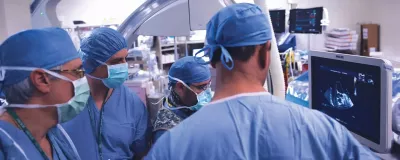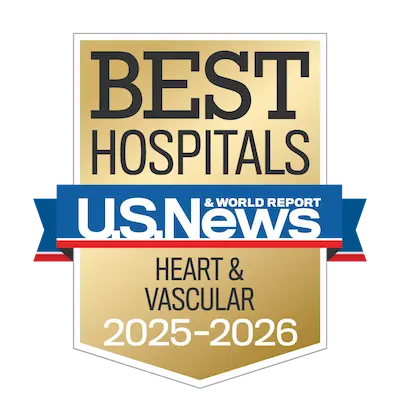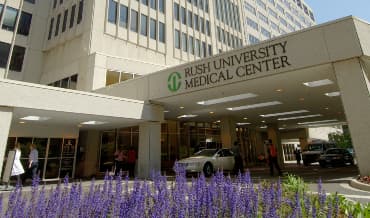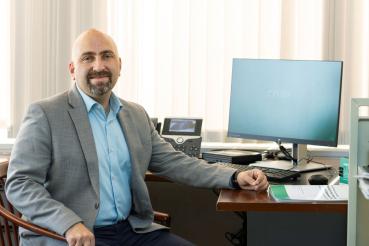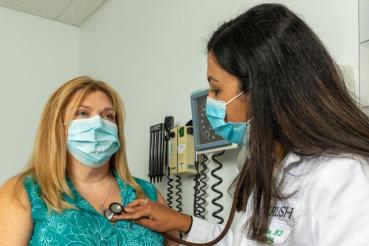Heart valve diseases affect one or more of the four valves of the heart that regulate blood flow within each of the heart’s different chambers.
There are two main common types of heart valve disease.
- Stenosis happens when a valve thickens or stiffens. Its opening becomes narrow and does not open properly.
- Regurgitation, or leaky valve, happens when a valve does not completely close, and blood flows through it in the wrong direction.
Many different conditions can lead to heart valve disease, including calcification, age-related degeneration of the valve, infections and conditions that people are born with, like bicuspid aortic valve.
Symptoms of heart valve disease can include the following:
- Shortness of breath
- Abnormal heartbeats
- Dizziness
- Fatigue
- Swelling in the legs
- Fainting
The most common symptom of heart valve disease is shortness of breath. At more advanced stages, it may lead to swelling in the legs and fluid buildup in the lungs. When fluid builds up in the lungs, it can cause more shortness of breath and syncope, or fainting.
But some patients with heart valve disease don’t show any symptoms before they are diagnosed. Their condition is often found during normal medical exams, sometimes when their general physicians hear heart murmurs and then refer them to cardiologists for diagnosis.
The Rush Approach to Heart Valve Disease Care
At Rush, specialists work together with their patients to offer the latest treatments and care for heart valve disease. Your team in Chicago and the surrounding region can include experts in heart valve disease diagnosis and therapies, interventional cardiologists, surgeons, anesthesiologists and, for young patients, pediatric cardiologists.
They can handle even the most complicated cases of leaky or narrowed heart valves.
Thanks to our advanced technology and devices, we can often treat these conditions through minimally invasive procedures. Options for care depend on which valve or valves are affected, what type of heart valve disease is present and which treatment will be most effective for you.
Minimally Invasive Treatments for Heart Valve Disease at Rush
The most common heart valve disease is mitral regurgitation, or leaky mitral valve. It’s usually treated with open heart surgery to repair or replace the valve. But older patients, those with severe illness or those who are at high risk may not be a good fit for surgery.
As an alternative, a minimally invasive, FDA-approved treatment called transcatheter edge-to-edge repair, or TEER, can help. It involves using a catheter inserted through the femoral vein of the groin to implant a device that helps the valve close properly. You’ll be under general anesthesia, and the interventional cardiologist will use ultrasound to guide placement of the implant.
The second most common valve problem is aortic stenosis when the aortic valve narrows, often related to age. In patients under age 50 to 55, open heart surgery is the usual treatment so that a new, mechanical aortic valve can be implanted
But older patients and those at higher risk for surgery can often have a minimally invasive procedure called transcatheter aortic valve replacement, or TAVR. Like TEER, it relies on a catheter through the groin. A replacement valve is implanted through the catheter within the older, narrowed valve.
Many heart valve diseases that have traditionally been treated with open heart surgery now have minimally invasive alternatives. For example, the FDA has recently approved two devices that can treat tricuspid regurgitation by implanting a clip or replacing the tricuspid valve.
Second Opinions for Heart Valve Disease at Rush
Getting a second opinion on your heart valve disease diagnosis or recommended treatments can help you learn more about your condition and have confidence in the decisions you make about your care.
Rush has extensive diagnostic tools to provide you with an accurate diagnosis, and our interventional cardiologists work with specialists from all fields of heart and vascular care to ensure that you have all available treatment options, including minimally invasive procedures whenever possible.
To get a second opinion on your heart valve disease, call Rush at (888) 352-7874. Our care coordinators will guide you through setting up appointments and help you gather any information you may need before seeing our heart and vascular team.
Structural Heart Disease Care at Rush

Rush Excellence in Heart Valve Disease Services
- Care that doesn’t fall through the cracks: At Rush, we are committed to ensuring that every patient is given the attention and resources they deserve. A care coordinator follows your care from your first day with us. They ensure your case is referred to the right specialists, that your entire care team is fully briefed on your case, and your treatment and follow-up appointments are handled correctly.
- Less invasive procedures: We can treat many heart valve diseases through minimally invasive, catheter-based procedures. That means faster recovery, less rehab and less pain for you. We are experts in TAVR (transcatheter aortic valve replacement), which involves replacing the aortic valve without open heart surgery, and TEER (transcatheter edge-to-edge repair), which involves placing a clip, such as the MitraClip, on the mitral valve to prevent regurgitation. These may be ideal options if you're not eligible for traditional surgery.
- Same-day treatment plans: You will meet with a team of specialists — including an interventional cardiologist and a cardiac surgeon — at the same time. Drawing on their many years of experience, these specialists develop a custom treatment plan and present it to you on the same day.
- Access to new treatments and trials: Rush heart specialists are engaged in important clinical trials, offering patients treatment not possible in other settings. Trials lead to innovative treatments, including transaortic valve replacement (TAVR), MitraClip and the CoreValve. Our participation in the TRILUMINATE study led to the FDA approval of the TriClip device, a minimally invasive treatment for tricuspid regurgitation. Our specialists continue to participate in research and clinical trials aimed at helping people with congenital and structural heart diseases lead longer, fuller lives.
- Nationally ranked health care: U.S. News & World Report includes Rush University Medical Center on its Best Hospitals Honor Roll and ranks our cardiology and heart and vascular surgery programs among the best in the nation.
FAQs About Heart Valve Disease
Some things that lead to heart valve disease are beyond your control. For example, you can’t prevent heart defects present from birth that lead to heart valve disease.
But there are many other things that increase your risk of heart valve disease that you can control. Recreational intravenous drug use can lead to infections that cause heart valve disease. High blood pressure, coronary artery disease, diabetes and heart failure can all lead to heart valve disease. Managing or avoiding these conditions will reduce your risk. Avoiding smoking and excessive drinking, managing your weight, having a healthy diet and exercising regularly can help, as well as medications or other therapies if your physician recommends them.
Another possible cause of heart valve disease later in life is having rheumatic fever as a child. This disease is not common in the U.S. But treating it properly in childhood when it does appear will reduce the risk of developing heart valve disease.
For younger, healthy patients with a high chance of full recovery, open heart surgery is the recommended treatment for many heart valve diseases. But for patients who are more at risk or have had previous unsuccessful treatment, minimally invasive procedures may be available as alternatives to surgery.
Many of these procedures rely on a small incision in the groin and are performed via a catheter that runs through the femoral vein to the affected heart valves. TEER and TAVR are two of these minimally invasive procedures to treat heart valve disease.
There are many possible causes of heart valve disease. Heart defects that are congenital, meaning they’re present from the time you’re born, can affect the valves of the heart.
Other heart and vascular conditions, including high blood pressure, coronary artery disease and heart failure can also lead to heart valve disease. Diabetes and obesity can contribute to these conditions.
Certain infectious diseases may also cause heart valve disease when they aren’t properly treated, including infectious endocarditis and rheumatic fever.
Heart valve disease can be connected to genetics, most often when it is related to congenital heart defects that are present from birth. For example, patients who have bicuspid aortic valve may have family members with the same condition. These patients often have multiple congenital defects, such as holes in the heart, atrial septal defect or ventricular septal defect, as well as defects in other areas of the body.
Your ability to exercise when you have heart valve disease depends on how severe your condition is. You must stick to the advice of your physician, and if you intend to exercise, make sure you discuss it with them first.
In general, there tend to be few restrictions on activity for patients who have heart valve disease. Your physician may discourage you from competitive exercises until your condition is under control. But after recovery, patients’ ability to exercise is usually back to normal.

